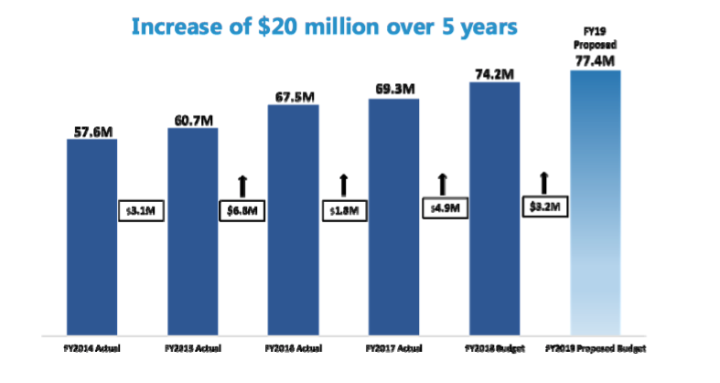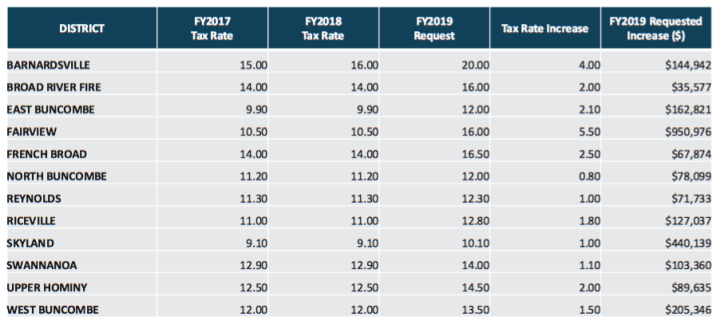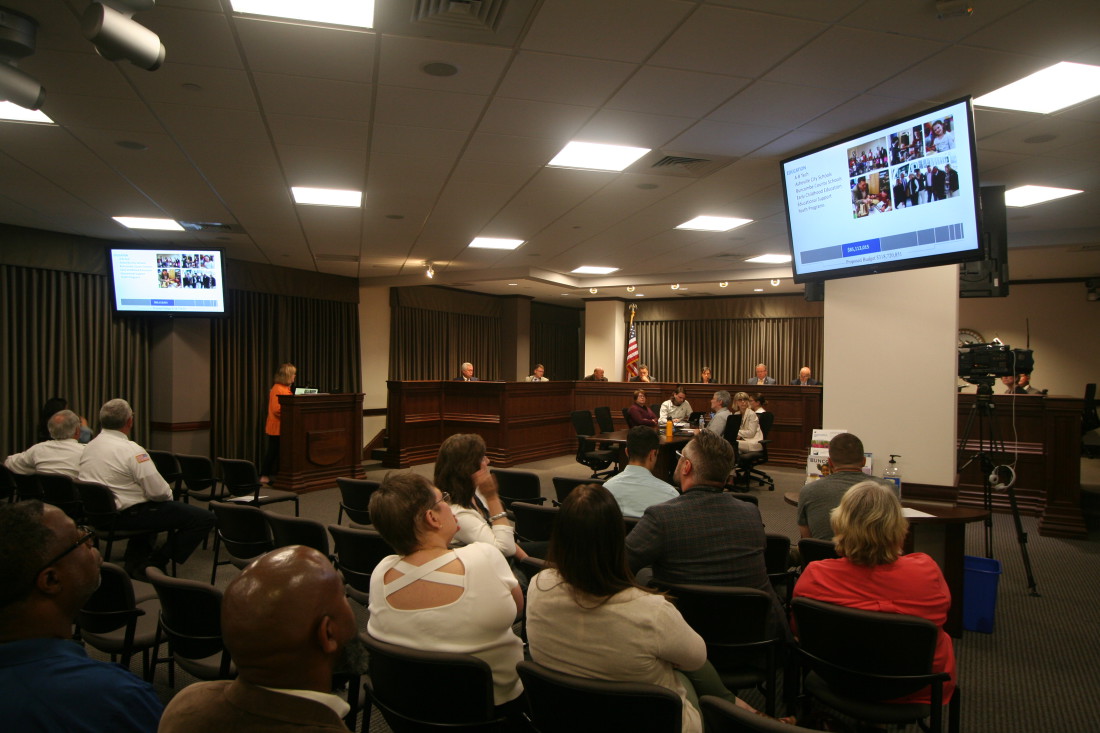It takes two hands to hold a bound hard copy of the Buncombe County budget for the upcoming year.
“Me being who I am, I read that book,” said Commissioner Al Whitesides during a Buncombe County Board of Commissioners meeting on May 15. “I went to sleep twice on it,” he quipped.
Following a presentation of the fiscal year 2019 budget by County Manager Mandy Stone, commissioners took time to applaud Stone and county staff for the transparency of the budget process this year, noting that it was an improvement over the process in prior years, which had been coordinated by former County Manager Wanda Greene.
Greene, who retired from her position last year, has since been indicted on fraud charges related to improper use of county purchase cards.
“We stepped in a bucket,” said Commissioner Mike Fryar. “You come out of the bucket pretty good I got to say, Ms. Stone.”
‘Night and day’
This year marks Whitesides’ second time weathering the county budget process as a commissioner, and he said the difference in his experience this year over last year is stark. “This year, for the first time, we have a budget that I feel comfortable voting on because I know what’s in it,” he said.
Commissioners indicated the process was more open than in years past. “I can tell you that input came countywide in this budget,” said Commissioner Joe Belcher. “Every commissioner had input and every commissioner had a say. I couldn’t say that about previous budgets.”
Board Chair Brownie Newman tells Xpress that this year is the first time commissioners have had access to a full hard copy of the county manager’s proposed budget. Before, the information was provided to commissioners piecemeal, and a piece of information provided at a budget work session could change without warning by the time the proposed budget was prepared, he says.
“This is something that I advocated for last year in the budget process, and frankly, it just didn’t happen,” Newman says. “It’s a really simple idea, but it’s literally not been done this way in the past.”
The county has made an effort to make the budget process accessible to members of the public in the wake of the allegations against Greene. The board has held public budget work sessions since November, which have been recorded and posted on the county website. The county has also created an online tool that allows members of the public to explore the proposed budget in detail.
Balancing needs
Staff initially developed a budget that dropped the county property tax rate by one cent (making it 52.9 cents per $100 of assessed value rather than the current rate of 53.9 cents), but scrapped the decrease to pay for additional funding requested by the Buncombe County and Asheville City school systems and A-B Tech. Stone said the requested increase totaled about $4 million, more than the $3.7 million increase produced by a one-cent adjustment to the property tax rate.

Stone recommended reducing the schools’ $4 million increased funding request by about $600,000 to avoid dipping too far into the county’s fund balance. To comply with its own policy, the board must set aside at least 15 percent of its revenues for emergencies, an amount equal to two and a half months of operating expenses.
The added funding for education will pay for salary and benefit adjustments expected to be mandated by the state, textbooks, graduation initiatives, new behavioral health positions and utilities. Part of the funding for the local school systems is contingent on the state’s final budget.
The county has increased its contribution to public schools from the general fund by $20 million over the last five years. “This is almost $4 million a year in increases,” Stone said. “It has, if you look over that same period of time, outpaced your growth, and if that level of growth in the increase continues, it will take increasing your property tax rate to support that.”
The part of this funding set aside for salary supplements, which helps keep pay for local public school teachers competitive with other systems in the state, increased by about $6 million between FY 2014 and FY 2018. In FY 2018, $20.3 million was set aside for salary supplements.
The proposed budget also contains an $8.6 million reduction in the amount of money appropriated from the county’s fund balance. Last year’s adopted budget contained about $15.4 million allocated from the county’s fund balance, although the county anticipates that it will end FY 2018 with this funding largely intact.
“We have got to learn to reduce our reliance on appropriated fund balance,” Stone said, “and this budget does that.”
Newman sees the change as a step in the right direction. In the past, Newman says the county has factored a significant amount of its fund balance into its budget calculations every year, but Newman says the county hardly ever ends up spending the budgeted money. “We actually spend about the amount that we take in,” he says.
While he sees this as a good thing, he believes this isn’t a meaningful or accurate way to plan the budget.

“We need a budget that accurately forecasts that we’re really going to spend in different departments and on different priorities and then do it and really stick to it,” he says.
The county’s proposed general fund budget for next year is $318,720,851, which marks a 3.6 percent ($12,014,537) decrease over last year’s general fund budget. The proposed budget also includes $107,849,894 in spending outside the general fund, a broad category that includes fire service districts and transportation.
New clerk
Commissioners have decided who they want to hire to replace County Clerk Kathy Hughes, who has served in the position since January 1983 and will retire this year on June 30.

The county received 209 applications for the job and interviewed 12 of those applicants before narrowing the search to six finalists.
During the meeting on May 15, commissioners thanked Hughes for her service to the county and voted to offer the job to Lamar Joyner, who has worked for the last 11 years as the deputy director of the board of elections in Forsyth County. He also has an engineering degree from North Carolina A&T State University.
“When we think about the qualities necessary for the clerk we were looking for somebody with an attention to detail,” said Lisa Eby, the county’s director of human resources. “In his current position, he has to make sure he’s compliant with all state laws, all federal regulations … which is a very important aspect of this position [county clerk].”
If he accepts the position, Joyner would serve in an interim position until Hughes retires. According to salary information available on the county website, Hughes receives $122,840 per year. Joyner’s base annual salary would be $80,000, according to the employment agreement offered to him by the county. Read the document in full below:
Joyner Emp Agmt 2018 by David Floyd on Scribd



Before you comment
The comments section is here to provide a platform for civil dialogue on the issues we face together as a local community. Xpress is committed to offering this platform for all voices, but when the tone of the discussion gets nasty or strays off topic, we believe many people choose not to participate. Xpress editors are determined to moderate comments to ensure a constructive interchange is maintained. All comments judged not to be in keeping with the spirit of civil discourse will be removed and repeat violators will be banned. See here for our terms of service. Thank you for being part of this effort to promote respectful discussion.